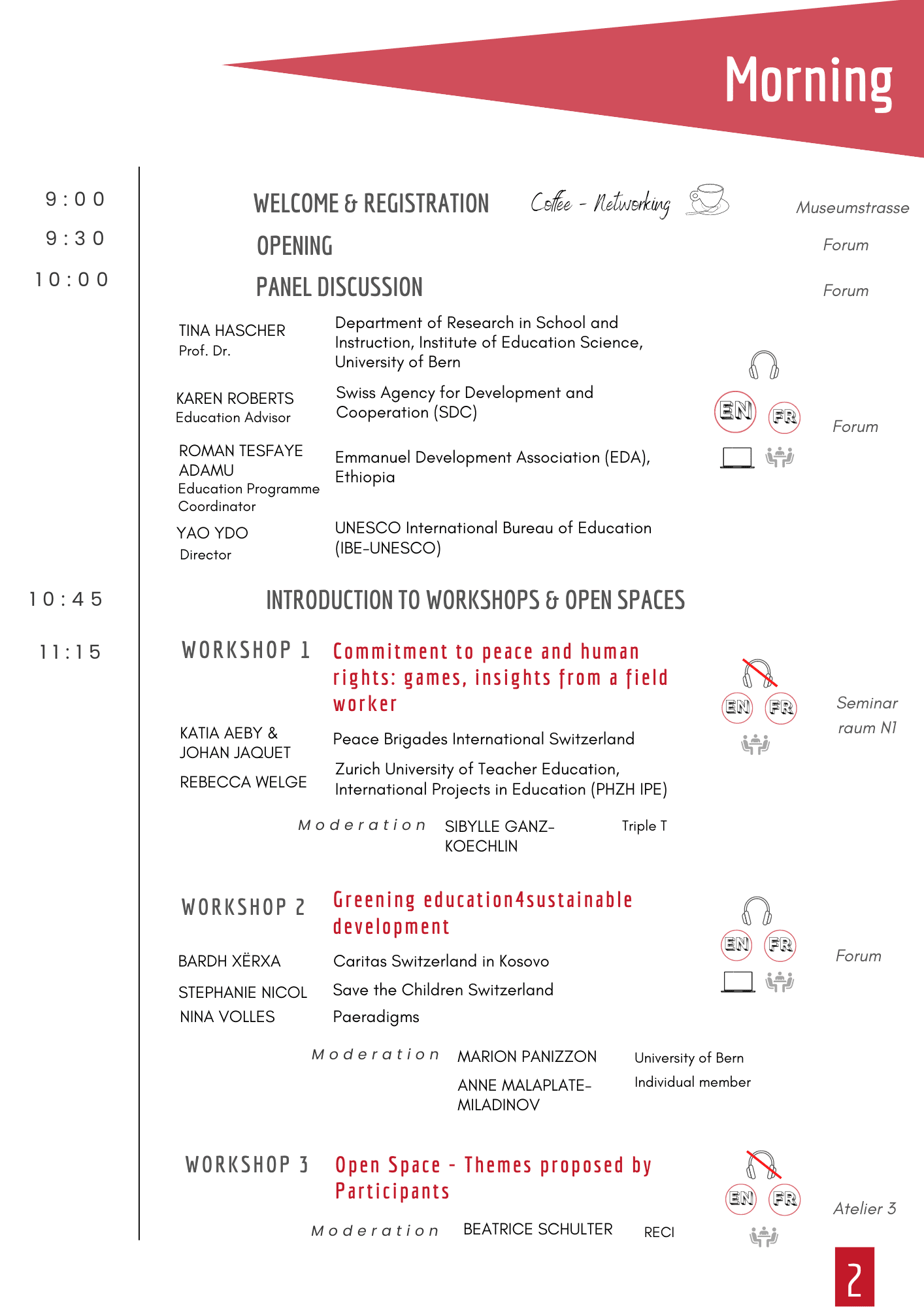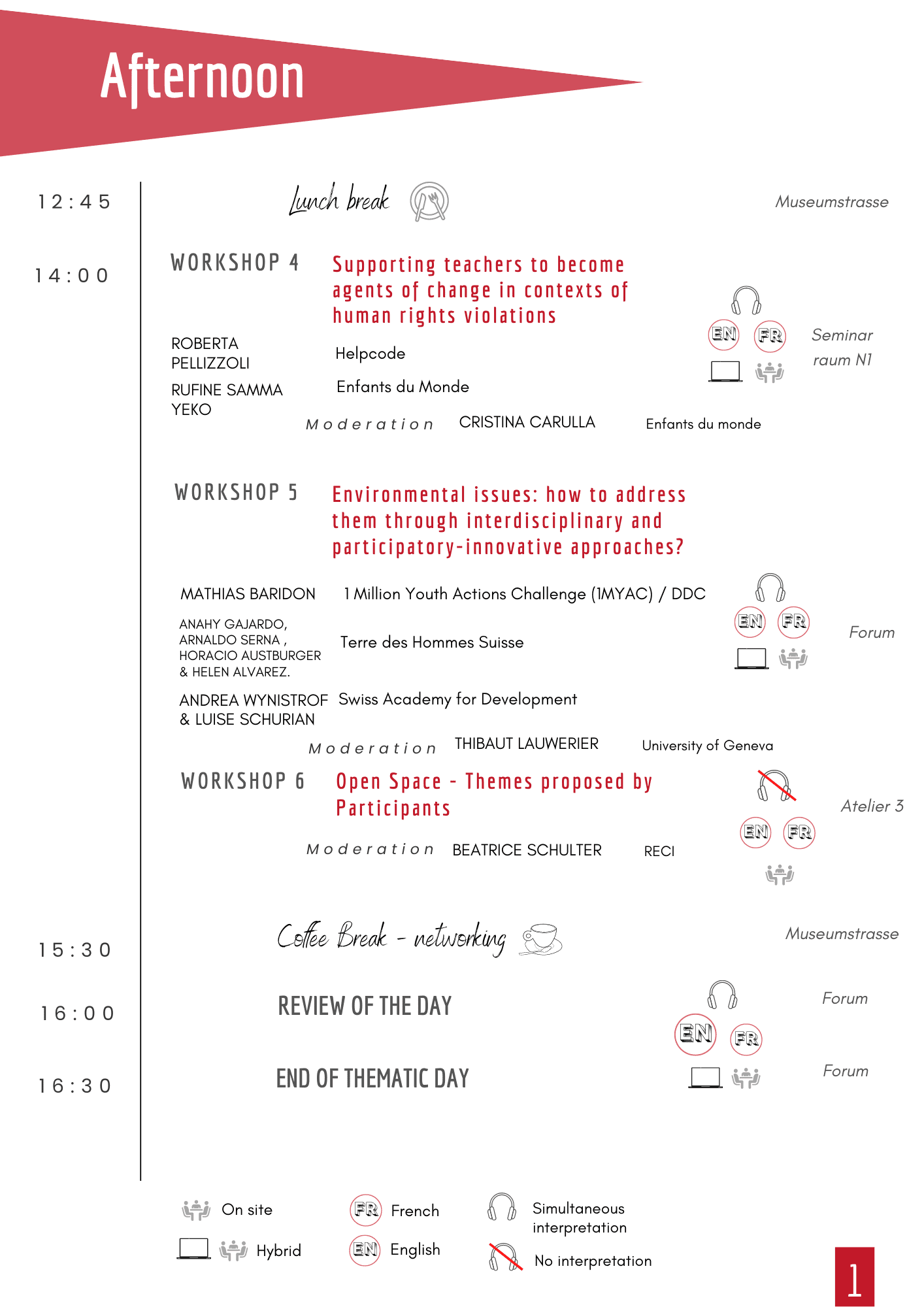November 16, 2022
Reframing Education for a Sustainable World
How to Support Teachers and Learners as Agents of Change to Achieve SDG 4.7?
RECI Thematic Day 2022 aims to provide a space for mutual learning, participatory exchange and development of new ideas on the current and future state of teacher education for sustainable development (ESD) and global citizenship education (GCE).
In two plenary sessions and several interactive and open space workshops with contributions from RECI members, IBE-UNESCO, SDC (Swiss Agency for Development and Cooperation) and many other partners, a wide range of participants in Switzerland and around the world have the opportunity to discuss approaches, practical tools, best practices, challenges and lessons learned for the further development of Education for a Sustainable Future worldwide.
There are still free places reserved for participants from the south! To register, write to us at info@reci-education.ch
Morning
Welcome & Opening
❯ Panel discussion 
- Yao Ydo, Director UNESCO International Bureau of Education (IBE-UNESCO)
- SDC Education Network
- Tina Hascher, Professor Dr. phil, Department of Research in School and Instruction, Institute of Education Science, University of Bern
1st round of Workshops
❯ Workshop 1 : Commitment to peace and human rights (through the game) 
- Contributions : PHZH IPE & Brigades International Switzerland
- Moderation : Sibylle Ganz-Koechlin, Triple T
❯ Workshop 5 : Environmental issues: participatory-interactive approaches to equip youth to be actors of sustainable development 
- Contributions : Swiss Academy for Development & Terre des Hommes Suisse
- Moderation : Thibaut Lauwerier, Université de Genève
❯ Workshop 3 : Open Space 
Afternoon
2nd round of workshops
❯ Workshop 4: Human Right (title to be confirmed) 
- Contributions: Helpcode & Enfants du Monde
- Moderation : Cristina Carulla, Enfants du Monde
❯ Workshop 5 : Environmental issues: participatory-interactive approaches to equip youth to be actors of sustainable development 
- Contributions : Save the Children & Paeradigms
- Moderation : Marion Panizzon (Université de Berne & World Trade Institute) & Anne Malaplate-Miladinov (Université Genève)
❯ Workshop 6 : Open Space 
Closing & Conclusions
![]() on site
on site ![]() hybrid
hybrid
International cooperation actors often work in the education and training of teachers, including in fragile contexts where access to quality education is not guaranteed for all. In the face of growing socio-economic inequalities, climate change, conflict and displacement, as well as humanitarian and global health emergencies schools systems, teachers and learners are faced with multiple challenges.
In this context the provision of Education for Sustainable Development (ESD) and Global Citizenship Education (GCE) are increasingly important, and teacher education and training answering to these challenges are crucial to ensure continuity of schooling and access to secondary, tertiary and vocational education for all.
In this context, SDG 4.7 calls for „significantly increasing the supply of qualified teachers, including through international cooperation in teacher education in developing countries, especially in least developed countries and small island developing states“.
The 2022 RECI Thematic Day will approach this urgent and topical issue through discussing some of the following questions – as well as the questions that you will bring to the space:
- How can teachers and learners be supported as agents of change to achieve the sustainable development goal SDG 4.7?
- What approaches help to reorient education towards a sustainable future?
- How does education for sustainable development and for sustainable lifestyles work?
- How does education for human rights, for gender equality, for promoting a culture of peace and non-violence, for global citizenship and appreciation of cultural diversity?
- How does education for cultural change go towards a culture of sustainable development?
International cooperation actors often work in the education and training of teachers, including in fragile contexts where access to quality education is not guaranteed for all. In the face of growing socio-economic inequalities, climate change, conflict and displacement, as well as humanitarian and global health emergencies schools systems, teachers and learners are faced with multiple challenges.
In this context the provision of Education for Sustainable Development (ESD) and Global Citizenship Education (GCE) are increasingly important, and teacher education and training answering to these challenges are crucial to ensure continuity of schooling and access to secondary, tertiary and vocational education for all.
In this context, SDG 4.7 calls for „significantly increasing the supply of qualified teachers, including through international cooperation in teacher education in developing countries, especially in least developed countries and small island developing states“.
The 2022 RECI Thematic Day will approach this urgent and topical issue through discussing some of the following questions – as well as the questions that you will bring to the space:
- How can teachers and learners be supported as agents of change to achieve the sustainable development goal SDG 4.7?
- What approaches help to reorient education towards a sustainable future?
- How does education for sustainable development and for sustainable lifestyles work?
- How does education for human rights, for gender equality, for promoting a culture of peace and non-violence, for global citizenship and appreciation of cultural diversity?
- How does education for cultural change go towards a culture of sustainable development?
We believe in the power of mutual learning and co-creation by bringing together different perspectives and experiences to build impetus and feasible solutions for global challenges in education.
During the RECI Thematic Day we open various spaces, where participants are invited to pose their questions and share their experiences and challenges – be they hands-on, thought-provoking or philosophical, to listen to others and jointly come up with new insights, practical tips, or new ideas. The use of participatory and interactive workshop methods will facilitate these processes of mutual learning and co-creation and ensure that all participants have space to talk about their projects, ask questions, contribute and develop new ideas together.
There will be four workshops led and prepared by RECI members. These workshops have a defined focus-theme and include inputs on projects and experiences of RECI members. Participants with a specific interest for the defined sub-theme are invited to come with their questions, own projects and experience. In addition to that there will be two Open Space workshops. These spaces can be used by participants to put forward further sub-themes that are not covered by the four other workshops, to raise questions from ever new perspectives, or to just engage in an in-depth conversation around SDG 4.7. and the challenges of teacher training and education.
Through this hybrid event, we enable a global exchange between education actors, practitioners, researchers and advocates, bringing different questions, experiences and perspectives to the space.

Morning :
- Workshop 1: Commitment to peace and human rights: games, reflections of a field actor – Read the pitch
- Workshop 2: Green education for sustainable development – Read the pitch
- Workshop 3: Open Space: theme(s) chosen by participants – Read the pitch
Afternoon:
- Workshop 4 : Supporting teachers to become agents of change in contexts of human rights violations – Read the pitch
- Workshop 5: Environmental issues: how to address them through innovative interdisciplinary and participatory approaches? – Read the pitch
- Workshop 3: Open Space – theme(s) chosen by the participants – Read the pitch

Organising Committee:
Thibaut Lauwerier (University of Geneva & TTQE Working Group Convenor), Anne Malaplate (Individual Member), Cristina Carulla (Enfants du Monde), Sibylle Ganz-Koechlin (Triple T), Marion Panizzon (University of Bern), Valeria Kunz and Derya Kaygisiz (Save the Children), Andrea Wynistorf and Giovanna Del Drago (SA4D), Anahy Gajardo (TdH), and the RECI backoffice (Beatrice Schulter, Nadine Bernasconi and Anna Sadilova)


